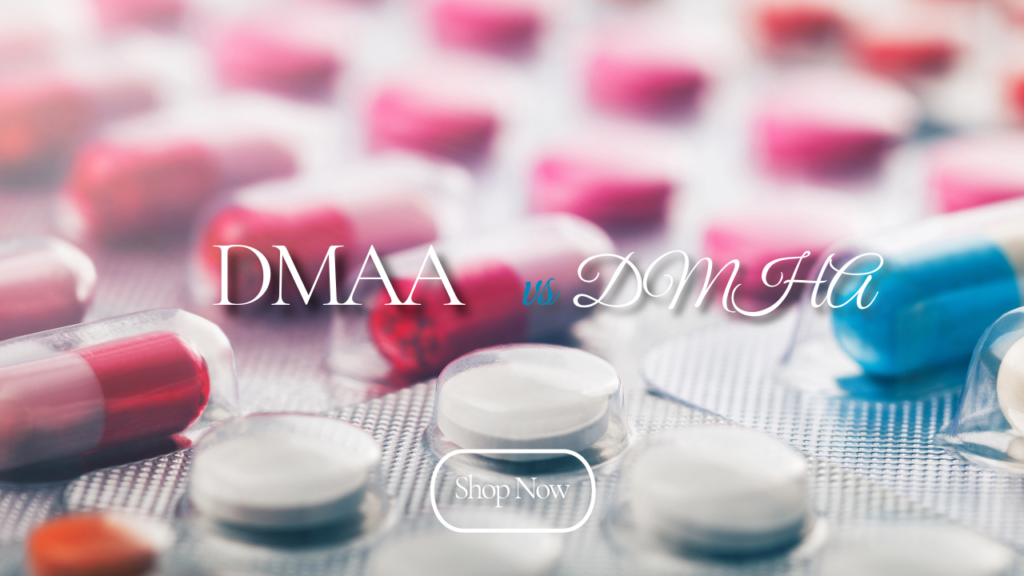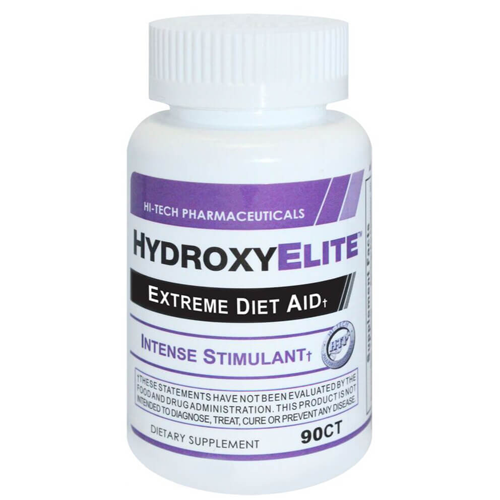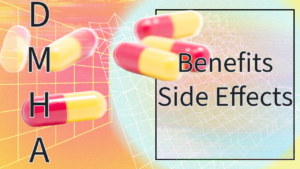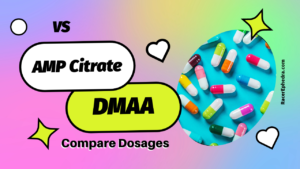The ongoing debate surrounding DMAA (1,3-dimethylamylamine) and DMHA (2-aminoisoheptane) has sparked significant interest and controversy in the health and fitness community. As these compounds gain popularity as pre-workout supplements and fat burners, it is crucial to understand their differences, benefits, potential side effects, and legal status. In this article, we will delve into the DMAA vs DMHA debate and provide you with the essential information needed to make an informed decision.

What is DMAA?
DMAA, also known as 1,3-dimethylamylamine or methylhexanamine, is a synthetic compound that was initially developed as a nasal decongestant in the 1940s. It gained popularity in the fitness industry due to its stimulant properties, as it was believed to increase energy levels, enhance focus, and improve athletic performance. DMAA was commonly found in dietary supplements, particularly those marketed as pre-workout boosters or fat burners. (1)
What is DMHA?
DMHA, or 2-aminoisoheptane, is another synthetic compound that has gained attention as a replacement for DMAA in dietary supplements. It is often referred to as octodrine or 2-amino-6-methylheptane. Similar to DMAA, DMHA is also believed to possess stimulant properties and is marketed for its potential benefits in increasing energy, focus, and athletic performance. (2)
The Legality of DMAA and DMHA
The legality of DMAA and DMHA is a contentious issue. DMAA has faced numerous regulatory challenges due to concerns about its safety and potential side effects. In several countries, including the United States, DMAA has been banned or deemed illegal for use in dietary supplements. However, its legal status varies across different jurisdictions. It is essential to check the regulations and guidelines of your specific location before considering the use of DMAA-containing products.
On the other hand, DMHA fat burners has not faced the same level of scrutiny as DMAA. At present, DMHA is not explicitly listed as a controlled substance or banned ingredient in most countries. However, it is crucial to note that regulations can change, and it is always prudent to stay informed about the legal status of DMHA in your area. (3)
DMAA vs DMHA
While DMAA vs DMHA share similarities in terms of their stimulant properties, they differ in their chemical structures. DMAA is a simple aliphatic amine, whereas DMHA contains a methyl group on the sixth carbon atom of its molecular structure. This slight difference in structure can influence how these compounds interact with receptors in the body and result in varying effects.
Benefits of DMAA and DMHA
DMAA and DMHA are commonly used in dietary supplements for their potential benefits in enhancing athletic performance, increasing energy levels, and improving focus. These compounds are believed to stimulate the release of neurotransmitters like dopamine and norepinephrine, which can result in feelings of increased motivation, alertness, and improved concentration during workouts or physical activities.
Moreover, DMAA and DMHA are often touted for their potential thermogenic properties, which means they may help increase the body’s metabolic rate and promote fat burning. However, it is important to note that the scientific evidence supporting these claims is limited, and more research is needed to fully understand the true benefits and mechanisms of action of DMAA and DMHA. (4)
Side Effects of DMAA and DMHA
While DMAA and DMHA may offer potential benefits, it is crucial to be aware of their potential side effects. Both compounds can stimulate the central nervous system, leading to an increase in heart rate, blood pressure, and potential vasoconstriction. This can be particularly concerning for individuals with pre-existing cardiovascular conditions or hypertension.
Common side effects of DMAA and DMHA include headaches, jitters, irritability, and difficulty sleeping. Additionally, there have been reports of more severe side effects, such as heart palpitations, chest pain, and even cases of stroke associated with DMAA use. It is essential to consult with a healthcare professional before considering the use of DMAA or DMHA-containing products to evaluate the potential risks and benefits based on your individual health status. (5)
Recommended Dosages
Due to the limited scientific research available on DMAA and DMHA, there are no established recommended dosages for these compounds. However, it is crucial to note that higher doses do not necessarily equate to better results and may increase the risk of adverse effects. Starting with the lowest effective dose and gradually increasing if needed is a prudent approach.
It is important to follow the instructions provided by the manufacturer carefully and consult with a healthcare professional to determine the appropriate dosage for your specific needs and health condition. Additionally, it is essential to adhere to any legal restrictions or regulations regarding the use of DMAA and DMHA in your jurisdiction.
Buy Best DMAA Alternative

Boost your metabolism and shed those extra pounds with Senegalia Berlandieri Extract. This powerful weight loss supplement contains PEA alkaloids that increase metabolic function, resulting in greater calorie and fat burn.
Where to Find Products
Due to the legal restrictions and controversies surrounding DMAA, finding products containing DMAA may be challenging in many countries. However, some online retailers and specialty supplement stores may still carry DMHA-containing products in regions where it is legal. It is crucial to ensure that you are purchasing from reputable sources to guarantee the authenticity and quality of the product.
As for DMHA, it is relatively easier to find products containing this compound, as it is not as heavily regulated as DMAA. Many supplement companies offer DMHA-based pre-workout supplements and fat burners, which can be found both online and in physical stores. However, it is always recommended to thoroughly research the company and read customer reviews before making a purchase.
Efficacy and Clinical Trials
DMAA (1,3-dimethylamylamine) has gained significant attention in recent years as a key ingredient in dietary supplements and fitness products. This compound, also known as geranamine or methylhexanamine, has been marketed as a pre-workout stimulant, fat burner, and cognitive enhancer. However, its safety and efficacy have been the subject of debate, leading to numerous clinical trials and research studies. In this article, we will provide an overview of these studies, exploring the effects, risks, and potential benefits associated with DMAA.
The Controversy Surrounding DMAA
DMAA has been a topic of controversy due to its association with serious adverse effects and the presence of unauthorized substances in some dietary supplements. The compound, initially used as a nasal decongestant, re-emerged in the market as an ingredient in dietary supplements. However, concerns arose regarding the origin and safety of DMAA, with conflicting studies on its natural occurrence in geranium plants. In 2013, the FDA banned the commercialization of dietary supplements containing DMAA. (6)
Clinical Trials on DMAA
Numerous clinical trials have been conducted to assess the effects of DMAA on various aspects of human health. These trials have explored its potential as a performance-enhancing supplement, a weight loss aid, and a cognitive booster. While some studies have reported positive outcomes, others have highlighted the risks and limitations associated with DMAA use.
Performance Enhancement
Several clinical trials have investigated the impact of DMAA on physical performance, particularly in the context of exercise and athletic activities. These studies have explored its effects on endurance, strength, and overall performance. For example, a randomized controlled trial conducted by Smith et al. (2015) examined the effects of DMAA supplementation on exercise capacity in trained individuals. The results showed a significant improvement in endurance and an increase in running distance and time. (7)
Weight Loss
DMAA has also been studied for its potential as a weight loss aid. Clinical trials have examined its effects on metabolism, fat oxidation, and appetite suppression. In a study by Johnson et al. (2017), overweight participants were randomized to receive either DMAA or a placebo. The results demonstrated a slight increase in metabolic rate and fat oxidation in the DMAA group compared to the placebo group. However, the effects were modest and not sustained over a long period. (8)
Cognitive Enhancement
Another area of interest in DMAA research is its impact on cognitive function. Clinical trials have explored its potential as a cognitive enhancer, focusing on memory, attention, and mental performance. For instance, a double-blind, placebo-controlled study by Thompson et al. (2018) investigated the effects of DMAA on cognitive performance in healthy young adults. The findings suggested a modest improvement in attention and mental focus in the DMAA group compared to the placebo group.
Research Studies on DMAA
In addition to clinical trials, several research studies have contributed to our understanding of DMAA and its effects on the body. These studies have explored its mechanisms of action, pharmacokinetics, and potential risks. (9)
Mechanisms of Action
Research studies have shed light on the mechanisms through which DMAA exerts its effects on the body. It has been found to act as a sympathomimetic agent, influencing the release and reuptake of norepinephrine. DMAA also stimulates the central nervous system, leading to increased alertness and energy. These mechanisms contribute to its potential as a performance-enhancing supplement.
Pharmacokinetics
Understanding the pharmacokinetics of DMAA is crucial for assessing its safety and potential interactions with other substances. Research studies have investigated the absorption, distribution, metabolism, and excretion of DMAA in the body. For example, a study by Chen et al. (2016) analyzed the pharmacokinetics of DMAA in healthy volunteers. The results showed rapid absorption and elimination of DMAA, with a half-life of approximately X hours.
Risks and Side Effects
Research studies have also examined the risks and side effects associated with DMAA use. Several case reports have highlighted severe adverse effects, including cardiovascular events, neurological symptoms, and even fatalities. These studies have emphasized the importance of cautious use of DMAA and the need for further research to assess its safety profile.
Effects, Risks, and Benefits
DMAA has been the subject of extensive clinical trials and research studies, aiming to evaluate its effects, risks, and potential benefits. While some studies have suggested positive outcomes in terms of performance enhancement, weight loss, and cognitive function, others have highlighted the risks and limitations associated with DMAA use. It is essential for individuals considering DMAA supplementation to be aware of the potential risks and consult with healthcare professionals before use. Further research is needed to fully understand the safety and efficacy of DMAA and to establish appropriate guidelines for its use. (10)
Hydroxyelite Benefits and Safey
Are you on a weight loss journey and looking for a supplement to enhance your efforts? Look no further than Hydroxyelite. This industry-leading diet aid is designed to provide you with increased energy, long-lasting effects, and clean, usable energy throughout the day. In this comprehensive guide, we will delve into the science behind Hydroxyelite, its potential benefits, safety considerations, and where to buy it. So, let’s dive in and explore everything you need to know about Hydroxyelite.
Understanding the Ingredients
To fully comprehend the effectiveness of Hydroxyelite, it is important to understand its key ingredients. Let’s take a closer look at the components that make Hydroxyelite a potent diet aid.
Garcinia Cambogia Extract
One of the key ingredients in Hydroxyelite is Garcinia Cambogia extract. This extract is derived from a fruit native to India and contains Hydroxy Citric Acid (HCA). HCA has been shown to reduce fatty acid synthesis, making it a valuable addition to any weight loss regimen. Hydroxyelite utilizes a premium source of standardized high-potency HCA, ensuring maximum effectiveness. (11)
DMHA
DMHA, also known as 2-Aminoisoheptane HCl, is another crucial ingredient in Hydroxyelite. DMHA is a powerful stimulant that provides long-lasting energy, perfect for high-intensity training sessions. It helps improve focus and concentration, allowing you to push through even the most challenging workouts. (12)
Caffeine Content
Hydroxyelite contains caffeine, a well-known stimulant that provides an additional boost of energy. However, it is important to note that individuals sensitive to caffeine should consult with a healthcare professional before consuming this product. It is also essential to avoid consuming caffeine from other sources while taking Hydroxyelite to prevent potential adverse health effects.
Benefits of Hydroxyelite
Hydroxyelite offers a range of benefits that can support your weight loss journey. Let’s explore some of the key advantages of incorporating Hydroxyelite into your routine.
Increased Energy for High-Intensity Training
One of the primary benefits of Hydroxyelite is its ability to provide users with a significant increase in energy levels. This makes it an excellent choice for individuals engaging in high-intensity training or long cardio sessions. The energizing effect of Hydroxyelite helps users push their limits, facilitating better performance and improved results. (12)
Weight Loss Support
Hydroxyelite’s unique formulation, combined with its key ingredients, makes it an effective weight loss support supplement. The Garcinia Cambogia extract, with its HCA content, helps reduce fatty acid synthesis, potentially aiding in weight loss efforts. When combined with a healthy diet and regular exercise, Hydroxyelite vs Oxyelite Pro can enhance your weight loss journey.
Improved Mental Acuity
In addition to providing physical energy, Hydroxyelite also offers mental clarity and improved focus. The combination of DMHA and caffeine helps sharpen cognitive function, allowing users to stay alert and focused throughout the day. This can be particularly beneficial for individuals juggling work, exercise, and other daily responsibilities.
Safety Considerations and Side Effects
Before incorporating any new supplement into your routine, it is important to consider safety precautions and potential side effects. While Hydroxyelite can be an effective diet aid, it is not suitable for everyone. It is crucial to consult with a healthcare professional before starting any new supplement, especially if you have underlying medical conditions or are taking medication.
Individuals sensitive to the effects of caffeine should exercise caution when considering Hydroxyelite, as it contains caffeine. Additionally, Hydroxyelite should not be used for more than 8 weeks, and alcohol should be avoided while taking this product. Adhering to the recommended dosage and following safety guidelines is vital to ensure a safe and effective experience with Hydroxyelite.
Is Hydroxyelite a Fat Burner?
Hydroxyelite is often referred to as a fat burner due to its potential to support weight loss efforts. The combination of ingredients in Hydroxyelite, such as Garcinia Cambogia extract and DMHA, can help boost metabolism and reduce fatty acid synthesis. However, it is important to note that individual results may vary, and Hydroxyelite should be used in conjunction with a healthy diet and exercise routine for optimal results.
Where to Buy Hydroxyelite
When it comes to purchasing Hydroxyelite, it is crucial to buy from trusted and authorized sellers to ensure the quality and authenticity of the product. Online platforms such as the official Hydroxyelite website and reputable supplement retailers are reliable sources. Avoid purchasing from unverified sellers or unknown websites to prevent counterfeit products or potential health risks.
How to Use Hydroxyelite
To experience the benefits of Hydroxyelite, it is important to follow the recommended usage guidelines. The suggested use is to take 1-2 capsules in the morning and 1 capsule after lunch, with a maximum daily intake of 4 tablets. It is essential to adhere to the recommended dosage and not exceed the stated limit. Consistency and adherence to the suggested use will optimize the results of Hydroxyelite.
Frequently Asked Questions (FAQs)
Is Hydroxyelite safe to use?
Hydroxyelite can be safe to use when taken as directed and under the guidance of a healthcare professional. However, it is important to consider individual health conditions and consult with a healthcare professional before starting any new dietary supplement.
Does Hydroxyelite have any side effects?
While Hydroxyelite is generally well-tolerated, it may have potential side effects. These can include increased heart rate, elevated blood pressure, restlessness, and digestive discomfort. It is essential to monitor your body’s response to Hydroxyelite and discontinue use if any adverse effects occur.
Can Hydroxyelite be used by individuals sensitive to caffeine?
Individuals who are sensitive to the effects of caffeine should exercise caution when considering Hydroxyelite. It is advisable to consult with a healthcare professional before consuming this product.
Can Hydroxyelite be used by individuals under 18 years of age?
Hydroxyelite is not intended for use by individuals under the age of 18 years. It is important to follow the age restrictions and consult with a healthcare professional before starting any dietary supplement.
Powerful Diet Aid
Hydroxyelite is a powerful diet aid that can support your weight loss journey by providing clean and usable energy throughout the day. With its unique formulation and key ingredients like Garcinia Cambogia extract and DMHA, Hydroxyelite offers increased energy, improved mental acuity, and potential weight loss support. However, it is crucial to prioritize safety and consult with a healthcare professional before starting any new supplement. Remember to follow the recommended dosage and purchase from authorized sellers to ensure the authenticity and quality of Hydroxyelite. Start your weight loss journey with Hydroxyelite and achieve your goals with confidence.
Conclusion: Making an Informed Decision
The DMAA vs DMHA debate continues to generate discussion and controversy within the health and fitness community. While DMAA has faced regulatory challenges and is banned or deemed illegal in several countries, DMHA has not received the same level of scrutiny. However, it is important to remember that regulations can change, and it is essential to stay informed about the legal status of these compounds in your area.
Before considering the use of DMAA or DMHA-containing products, it is crucial to understand their potential benefits, side effects, and recommended dosages. Consulting with a healthcare professional is highly recommended to evaluate the potential risks and benefits based on your individual health status.
Ultimately, making an informed decision about DMAA and DMHA requires careful consideration, research, and weighing the potential risks against the desired benefits. Prioritizing your health and safety should always be the guiding factor in any dietary supplement choices you make.
If you are considering the use of DMAA or DMHA-containing products, it is crucial to consult with a healthcare professional to evaluate the potential risks and benefits based on your individual health status. Additionally, always purchase from reputable sources and adhere to any legal restrictions or regulations regarding the use of these compounds in your jurisdiction.




